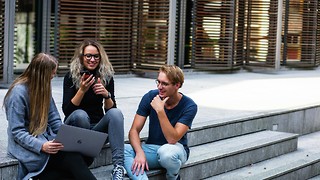Interview: Martti Ahtisaari
Hesham Mashhour interviews the former President of Finland, Nobel Peace Prize winner and United Nations diplomat

Martti Ahtisaari strikes any audience as being both endearing and charming; with a soft and quiet voice he doesn’t need much to gain respect. But what comes across most is how humble he really is, this former President of Finland, Nobel Peace Prize Laureate and United Nations diplomat. Ahtisaari, who earlier in the same day was recognised by a group of ecstatic Norwegian students, tells me first about his childhood and how conflict helped dictate his policy as president much later in life: “we lost 11 per cent of our land when they attacked my country in 1939 and I was then only two years old, but we stayed a bit longer and started moving to the rest of Finland and settled finally in the eastern part.” He continues, “in the meantime we lived in a farming community... they were very kind to us, treating us like members of their own family – it impressed me tremendously because they had no obligation to do so.” It soon becomes clear to me that it is this that inspires Martti Ahtisaari’s sense of duty and community and his sensitivity to other people’s needs.
As President of Finland he hoped to “give a chance for those who have gone through a similar experience,” and “share the burden with other countries.” He places a great deal of emphasis in our conversation on the importance of a fair society – one “where everyone gets a chance in life.”
He begins to share his religious upbringing and beliefs as a practising Christian. I ask him about having ended every radio statement to his country people with, “God bless you,” and he talks about his highly religious father and his work with Finnish missionaries in Pakistan. He then defends his decision to end his annual address to the nation, stating that he did it to provide comfort for some of his people. Martti Ahtisaari’s understanding of faith is clearly as a benevolent entity that offers support when needed and binds together a community.
We discuss the details of Ahtisaari’s decision not to sign a letter by other Nobel Peace Prize Laureates protesting the imprisonment of Nobel prizewinner Liu Xiaobo. He answers “if l look at my own career, I have participated very little in any public statements... because I have always felt that I would rather use my influence to solve or assist the person without going public because sometimes I have felt it was too easy to make a public statement.” He continues: “sometimes I have the feeling that I would lose all the credibility if I support every good thing; it’s not my style – I’d rather try to see if there is something I and some of my friends could do to actually try to solve the situation.” It really resonates through our conversation how committed Martti Ahtisaari is to causing a positive change in the world.
We end our conversation on the subject of Barack Obama’s Nobel Peace Prize, criticised by many as being nothing more than a publicity scam. Ahtisaari defends the decision to award the prize to Barack Obama, saying he feels that the prize is nothing more than an “encouragement” to solve problems. He continues by saying that he feels that Obama's speech in Cairo was "magnificent" but that perhaps the prize was an indication that Obama was now expected to deliver.
As the interview draws to a close, I feel enamoured by a man who lives up to so many ideals and principles and yet still survives, succeeds and instigates change in the real world. His understanding of life is profound and deserves deep respect. He leaves, and only then do I realise how humble he was throughout.
 News / British Academy elects 12 Cambridge academics22 July 2025
News / British Academy elects 12 Cambridge academics22 July 2025 News / Lord Smith elected Cambridge chancellor23 July 2025
News / Lord Smith elected Cambridge chancellor23 July 2025 News / Cambridge scholarship recipient trapped in Gaza21 July 2025
News / Cambridge scholarship recipient trapped in Gaza21 July 2025 Comment / Stop disarming people of their nuance23 July 2025
Comment / Stop disarming people of their nuance23 July 2025 News / Chancellorship candidates express concern about conduct of election 19 July 2025
News / Chancellorship candidates express concern about conduct of election 19 July 2025








